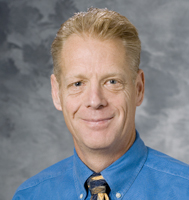 Marlowe Eldridge, MD, entered medical school with BE in bioengineering and MS in mechanical engineering. Directly after earning his MD at the University of New Mexico School of Medicine, he completed a post-doctoral year studying magnetic resonance spectroscopy before completing a pediatric residency at the University of Utah Medical Center and Primary Children’s Hospital. A four-year clinical fellowship in pediatric critical care medicine concurrent with a research fellowship in integrative cardiopulmonary physiology at the University of California, San Francisco further equipped Eldridge with an exceptionally wide range of robust scientific knowledge and skills, as well as facility in new imaging technology. He has never stopped learning.
Marlowe Eldridge, MD, entered medical school with BE in bioengineering and MS in mechanical engineering. Directly after earning his MD at the University of New Mexico School of Medicine, he completed a post-doctoral year studying magnetic resonance spectroscopy before completing a pediatric residency at the University of Utah Medical Center and Primary Children’s Hospital. A four-year clinical fellowship in pediatric critical care medicine concurrent with a research fellowship in integrative cardiopulmonary physiology at the University of California, San Francisco further equipped Eldridge with an exceptionally wide range of robust scientific knowledge and skills, as well as facility in new imaging technology. He has never stopped learning.
After a short time with pediatrics at UC Davis, Eldridge joined the UW Department of Pediatrics in 2000. His clinical practice was in pediatric critical care, and he served as that division’s chief from 2008 to 2019. His main focus, however, was research. From 2002 onward, Eldrige has served as the director of the John Rankin Laboratory of Pulmonary Medicine, now within the UW School of Medicine and Public Health.
He developed his own research team as well. Each year he has welcomed four to five undergraduate student researchers into his integrative cardiopulmonary physiology and pathophysiology lab. Many have gone to present their own research at meetings and several have won awards for their work.
The Eldridge Research Group focuses on integrative cardiopulmonary physiology and pathophysiology, particularly cardiopulmonary interactions in congenital and acquired lung disease. The lab uses diverse methods to investigate cardiopulmonary pathophysiology in small and large animal lung disease models, in human subjects, and in patients.
Eldridge’s recent research projects include investigating the long-term impact of premature birth and aggressive ventilator therapies, including hyperoxia on cardiopulmonary function. The lab team measures right heart function and pulmonary vascular reactivity during exercise and hypoxic stress in children and young adults who have a history of premature birth and bronchopulmonary dysplasia.
Another area of inquiry is the characterization of blood and oxygen flow through lung and heart pathways in both healthy people and those with chronic lung disease. Studying the effectiveness of stem cells to mitigate problems with lung transplants is yet another interest of the lab. Finally, Eldridge and his team have worked to develop protective decompression strategies following saturation dives for the United States Navy. Edridge and his research group are associated with 159 published papers.
Throughout his career at the UW, Eldridge has been acknowledged with many research honors and awards. Indeed, he received the Department of Pediatrics’ Gerard B. Odell Research Award in 2007, and he was selected to deliver the Gerard B. Odell Lecture in 2010. His clinical awards include many years of inclusion in “Best Doctors in America,” and “America’s Top Pediatricians.”
Eldridge will retire this month.
Five Questions for Marlowe Eldridge, MD
How has your career surprised you, compared to how you had expected it to develop when you began?
No real surprises. I planned to be in academic medicine with a robust research laboratory and that happened. The surprise was ending up in Madison, Wisconsin. I was sure I would be somewhere in the west. It turned out that the UW was the perfect place to develop my career and Madison a great place to raise our children.
What do you consider to be your biggest achievement?
The biggest accomplishment was securing the NIH grants and establishing a productive research laboratory.
What was the biggest obstacle to overcome?
The biggest obstacle was getting that first big grant.
What advice would you offer to new physicians just starting out?
When medical students ask my advice about career choices, I advise them to go into a specialty that they truly enjoy. Don’t make it about money or lifestyle. Being a physician is a demanding job, so you want to wake up in the morning excited about going to work. I give the same advice to residents deciding about subspecialties. And the most important advice is “take the stairs”!
Do you have specific plans for your retirement?
My wife and I will move to our mountain house in Buena Vista, Colorado. That will be our basecamp. Our children and grandchildren live in or west of the Rocky Mountains. The plan is to spend as much time as possible adventuring with them.